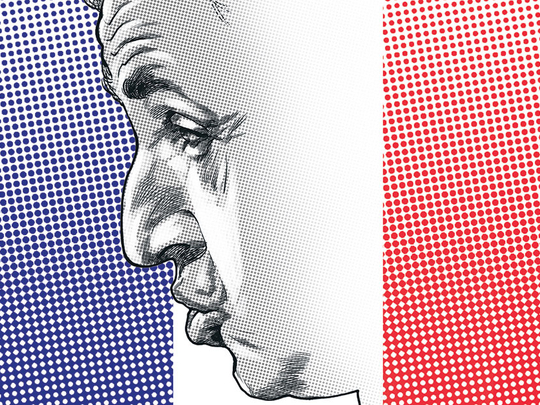
Former French President Nicolas Sarkozy has just taken the first step in his political comeback. Although he declared in 2012 that he would never run again “unless exceptional circumstances demand it” — and even then “surely not through regaining the control of the UMP party” — he was re-elected last month to the helm of the party. The score was not as brilliant as he’d wish for but surely shows he is still popular among party members, if not among the French.
President Francois Hollande indeed was not that much “elected” in 2012 as Sarkozy was “defeated” (not because of his policies but mainly because of his behaviour). Sarkozy’s personality, everyone admits, is very irritating. Former collaborators (both those who have since become his fans or his enemies) all confirm what the French have already determined.
First, Sarkozy never stops talking (he rarely listens to others), and speaks mostly about himself. An oversized ego, a touch of megalomania and subconscious arrogance make him believe the rest of the world is made up of idiots.. This, however, doesn’t prevent him from taking credit for others’ successes. He divides the nation instead of uniting it.
Second, Sarkozy gives the feeling that he lacks conviction – or at the least, sincerity. The forced manner in which he finally agreed on the future annulment of the gay marriage law, as anti-gay marriage demonstrators demanded it two weeks ago at a meeting, was revealing. Worse, he happens to change his mind quite often (always giving a good reason for it), which makes him appear shaky.
Third, he loves money. What’s wrong with that? Nothing, unless you wish to be a President of the French Republic. In such case, you cannot say “I want to make money,” simply because the French won’t accept it. As the French hardly swallowed, on the 2007 election night, he spent his first hours as a President at the snobbish Paris restaurant Fouquet’s (and the week after on the private yacht of his billionaire friend Vincent Bolloré).
A first element to consider is the state of the country, which a ‘normal’ president has brought to a point wherein many Frenchmen are hoping for a ‘non-normal’ president. Sarkozy, indeed, is not ‘normal’. He claims to be a ‘leader’, that is somebody with a moral obligation to have a vision.
Second, not only does Sarkozy have poor competitors (though this time he may have to fight harder than anticipated) but he also enjoys a unique competitive edge. He always goes where nobody expects him to be.
Asked recently at a small gathering whether he had ‘changed’, he was honest enough to say that nobody would believe him. But immediately, he added that he would now change the ‘software’: “I want to bring in new concepts. I don’t recognise myself in any of the present debates.” Here are a series of examples on which few of his adversaries have so far made relevant comments.
“Federal Europe versus confederal Europe? Absurd! Germany and France account for more than 50 per cent of the EU’s GDP: not all countries are equal ... The first thing France should do is to go to Berlin and draw the lines of a common fiscal and economic policy, because history shows that when France and Germany go apart, it’s war, and when they work together, it’s peace.”
US-style system
Another example: “A presidential regime or a parliamentary regime in France? Absurd! One head is elected by the people and the other one is appointed. Guess who the boss is?” And others: on the necessary re-building of Europe; the possible introduction in the French public service of some kind of US-style system that would allow for making reforms in a French public service, which is totally shielded from any questioning of accrued benefits; a referendum, if and when elected, on allowing the reduction of the number of parliamentarians by 30 per cent, and engraving the principle that no more allowances will ever be paid by the State, unless there is a compensating remunerated activity.
These comments, which very few would expect in the present French political debate, are somewhat refreshing. Will Sarkozy stick to them – or forget them, as so often in the past? Will the many ‘affairs’ surrounding him leave him in peace until 2017? Will Hollande be then in the same messy state and his Prime Minister Manuel Valls have failed? Too hazardous to say today. But Sarkozy confirms once more the old saying: “Never wound a wild animal without killing him.” He seems more alive than ever.
Luc Debieuvre is a French essayist and a lecturer at Iris (Institut de Relations Internationales et Strategiques) and the Faco Law University of Paris.












